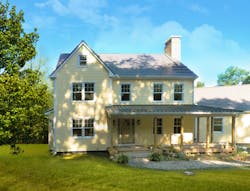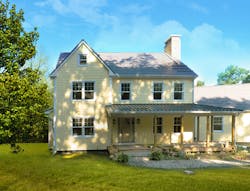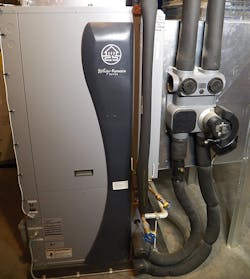Net-zero energy home features solar, geothermal system
SOUTH GLASTONBURY, CONN. — When Carl Benker and his wife, Elizabeth Wegner, designed their first home, the couple never intended to win contests or awards. “As the parents of two young children, we just wanted to build something that was right for the world today and the world we will leave behind for our children and for our grandchildren,” said Benker.
Together they selected a builder with a similar philosophy — Glastonbury Housesmith LLC in South Glastonbury, Connecticut. The builder’s sustainability message reads, “Each home reflects our desire to substantially reduce our impact on the world which will affect our children, grandchildren and all future generations.” The Benker home is no exception.
That’s why the 2,755-sq.ft. home has won three prestigious awards. Early this year the Benker home was named the winner of the 2014 Connecticut Zero Energy Challenge, a statewide design/build competition for single- and multi-family homes that challenges builders and homeowners to create homes that consume as little energy as possible. Residential Energy Services Network (RESNET) rating standards determine each home’s Home Energy Rating System (HERS) Index, a nationally recognized scoring system that measures energy performance. The lower the number, the more energy efficient the home. A score of zero represents a net-zero energy home.
With a HERS Index of -23, the Benker/Wegner residence also won the RESNET 2015 Cross Border Challenge, sponsored by RESNET and its Canadian counterpart, CRESNET. The challenge recognized the residence as the home reporting the lowest HERS Index with photovoltaics (PV) that was built in North America in 2014.
Colorado’s State Capitol Building serves as beacon of sustainability
Geothermal install delivers net-zero for the newest Proud Green Home
Steven Winter Associates, Inc. (SWA), in their role as an ENERGY STAR rater, LEED for Homes provider and rater and National Green Building Standard verifier, nominated the home for this award and guided the team through the Connecticut Zero Energy Challenge. Most recently, the home was named a 2015 Housing Innovation Award winner by the U.S. Department of Energy.
Solar array, geothermal make a good match
The Benker home produces more energy than it needs, thanks to a PV array on a steel pole that rotates and follows the sun throughout the day. The PV array generates enough electricity to power everything in the home, including all appliances, lights, hot water heater and the home’s heating and cooling system — that makes it net-zero. The extra energy it produces will be used to power an electric car for approximately 12,000 miles per year.
Deciding to install a geothermal heating and cooling system was a big decision. Carl’s family has been in the fuel oil business since 1923, so he briefly considered installing a fuel oil system.
“But I really wanted to build a home with as small a fossil-fuel base as possible,” he said. “There are only so many ways to heat a house without using fuel oil, natural gas or propane. We could have selected an electric resistance heating system, but from an efficiency, performance and comfort standpoint, geothermal was a much better choice.”
Benker selected Guy Wanegar and his company, A&B Cooling & Heating Corporation, in South Windsor, Connecticut, to install the geothermal system. Wanegar first offered geothermal installations in 1995. Today they comprise 95 percent of his business.
Efficiency, cleanliness, comfort
“We sell geothermal on three advantages,” said Wanegar. “One is the efficiency geothermal offers. Nothing can touch it as far as efficiency goes. Second, we sell it on cleanliness. The carbon footprint of a house using a geothermal system is extremely small, because the system doesn’t burn any fossil fuels. Third, we sell the comfort a geothermal system provides. Our customers always remark that they are much more comfortable with geothermal than they ever were with a conventional heating and cooling system.”
Wanegar came to the Benker project with 18 LEED certified homes under his belt, including the state’s first LEED Gold residential project, which he also completed with Glastonbury Housesmith.
“As a company, we’re used to installing geothermal systems that meet LEED standards,” said Wanegar. “So that’s the way we approach every job today.” That approach appealed to Benker, who had decided to seek LEED certification for his home.
“It wasn’t a goal of ours, but the way we designed and built the house, it seemed we could earn LEED certification without taking any special steps,” said Benker. “I wanted it more for some day in the future when we sell the house — something that might appeal to buyers.”
The geothermal system for the Benker/Wegner residence uses two, 300-ft. vertical wells for the geothermal loop and a WaterFurnace 7 Series variable capacity geothermal heat pump. The
7 Series is the first variable capacity geothermal unit available for homeowners and surpasses an Energy Efficiency Ratio (EER) of 41 in cooling and a 5.3 Coefficient of Performance (COP) in heating.
“It’s easily the most efficient unit out there,” said Wanegar. “It operates with the WaterFurnace IntelliZone 2 zoning system, which regulates the temperature in each of the home’s three zones to provide maximum comfort and energy savings.”
Free hot water
The 7 Series is also equipped with a desuperheater, which provides all of the domestic hot water during the summer. In the winter, the WaterFurnace unit will pre-heat water and a hybrid hot water heater will finish heating it to the required temperature. The hot water system also uses insulated tubing to reduce heat loss and an on-demand hot water recirculation system that stops warm water from being wasted when waiting for hot water to arrive at the faucet.
“Using a desuperheater is really efficient,” said Wanegar. “It’s almost like free hot water, especially in the summer.”
Benker and his wife are happy with their decision to use a geothermal system. “It’s more efficient than anything else out there in terms of space conditioning, and during the summer, it does a better job managing humidity. We keep the house at 78 degrees, and it feels absolutely comfortable, because the humidity is only 50 percent. It also responds very quickly to the thermostat and gradually ramps up and down, so that we never feel blasts of hot or cold air. The temperature remains uniform and comfortable. And the 30 percent federal tax credit makes it affordable. I have to say that of all the mechanical systems in our house, my favorite is the geothermal system.”
The house is filled with a variety of other sustainable features, including:
- Energy recovery ventilator that exhausts humid or stale indoor air and provides conditioned fresh air to the space
- ENERGY STAR appliances, including a heat pump clothes dryer and induction cooktop
- LED lighting fixtures
- Low VOC, GREENGUARD-certified components, including insulation, drywall, joint compound and wood finishes
- Thermomass centrally insulated foundation with an R20 total insulating value
- Naturally cooled root/wine cellar maintained at 56 degrees year ‘round without using any power
- Aluminum roofing shingles with a 70-plus-year life span
- Fire sprinkler system that uses the existing cold water supply lines
- Framing designed to withstand higher than code-required hurricane wind loads
- Windows with orientation-specific solar heat gain to maximize winter solar heating and reduce summer cooling requirements
“The house came out just the way we had hoped it would, and I’m convinced that anyone can build a net-zero home,” said Benker. “It takes some research, careful planning and assembling the right team, but in the end, the benefits are worth the extra effort, not only today, but for years to come. Given how much energy is used to heat and cool a house, a geothermal system is a ‘must’ to be energy efficient.”


